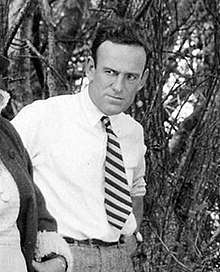Sam Wood
Samuel Grosvenor Wood (July 10, 1883 – September 22, 1949) was an American film director and producer, who is best known for directing such Hollywood hits as A Night at the Opera, A Day at the Races, Goodbye, Mr. Chips, and The Pride of the Yankees, and for his uncredited work directing parts of Gone with the Wind. He was also involved in a few acting and writing projects.
Sam Wood | |
|---|---|
 | |
| Born | Samuel Grosvenor Wood July 10, 1883 Philadelphia, Pennsylvania, United States |
| Died | September 22, 1949 (aged 66) Hollywood, California, U.S. |
| Other names | Shad Applegate |
| Occupation | Film director, writer, producer, actor, real estate broker |
| Years active | 1917–1949 |
| Spouse(s) | Clara L. Roush
( m. after 1908) |
| Children | 2 |
Life and career

Wood was born in Philadelphia, Pennsylvania,[1] and attended M. Hall Stanton School.[2]
After Wood lost what Hedda Hopper described as "a fortune" in real estate,[3] he began his career as an actor.[1] His billing depended on his role; as a leading man, he was billed as Sam Wood, but in villainous roles he was billed as Shad Applegate.[3] He worked for Cecil B. De Mille as an assistant in 1915. A solo director by 1919, Wood worked throughout the 1920s directing some of Paramount Pictures's biggest stars, among them Gloria Swanson and Wallace Reid.
He joined Metro-Goldwyn-Mayer in 1927, where he spent most of his career.[4] While filming the Marx Brothers' A Day at the Races, Wood became exasperated by the brothers' lack of seriousness on the set and shouted, "You can't make an actor out of clay!" Groucho Marx immediately replied, "Nor a director out of Wood!"[5]
Wood directed Ginger Rogers through her Oscar-winning performance in Kitty Foyle (1940). He himself was nominated for Best Director, one of his three career nominations in the category.
Wood continued to have a large number of box office hits in his career, right up to and including his last film, the gritty Western Ambush (1950),[6] although he died before the film was released.
Political beliefs
Wood became increasingly and aggressively conservative. In 1943, he reduced much of the anti-fascist content of For Whom the Bell Tolls, saying "It would be the same love story if they were on the other side." In 1944, he founded and served as president of the Motion Picture Alliance for the Preservation of American Ideals.[7] The organization quietly lobbied the House Un-American Activities Committee to examine Communist elements in the movie industry, which they did in 1947. Wood had been keeping a black notebook in which he wrote the names of those he considered subversive. His daughter Jeane Wood said that his crusade "transformed Dad into a snarling, unreasoning brute." Shortly following a 1949 meeting of his Motion Picture Alliance in which he had raged against a liberal screenwriter who was suing the group for slandering him, Wood suffered a fatal heart attack. He had added a condition to his will: No one, including his children, could collect their inheritance until they filed a legal affidavit affirming that they had never been Communists.[8]
Family
Samuel Grosvenor Wood was born on July 10, 1883 in Philadelphia, Pennsylvania to William Henry Wood and Katherine (Corn) Wood. Wood was married to Clara Louise Roush on August 25, 1908 and until his death in 1949. One of Wood's daughters, born Gloria Wood, was film and television actress K.T. Stevens.[3] Another daughter was also an actress, Jeane Wood who married Joe Sawyer.
Death
Wood died from a heart attack, in Hollywood, at the age of 66. His grave is located in Glendale's Forest Lawn Memorial Park Cemetery.
For his contribution to the motion picture industry, Wood received a star on the Hollywood Walk of Fame at 6714 Hollywood Boulevard on February 8, 1960.[9][10]
Filmography
Earlier films
With Academy Award nominations and wins in the table
- Double Speed (1920)
- Excuse My Dust (1920)
- The Dancin' Fool (1920)
- Sick Abed (1920)
- What's Your Hurry? (1920)
- A City Sparrow (1920)
- Her Beloved Villain (1920)
- Her First Elopement (1920)
- The Snob (1921)
- Peck's Bad Boy (1921)
- The Outside Woman (1921)
- The Great Moment (1921)
- Under the Lash (1921)
- Don't Tell Everything (1921)
- Her Husband's Trademark (1922)
- Her Gilded Cage (1922)
- Beyond the Rocks (1922)
- The Impossible Mrs. Bellew (1922)
- My American Wife (1922)
- Prodigal Daughters (1923)
- Bluebeard's 8th Wife (1923)
- His Children's Children (1923)
- The Next Corner (1924)
- Bluff (1924)
- The Female (1924)
- The Mine with the Iron Door (1924)
- The Re-Creation of Brian Kent (1925)
- Fascinating Youth (1926)
- One Minute to Play (1926)
- Rookies (1927 film) (1927)
- A Racing Romeo (1927)
- The Fair Co-Ed (1927)
- The Latest from Paris (1928)
- Telling the World (1928)
- So This Is College (1929)
- It's a Great Life (1929)
Later films
References
- "Biography for Sam Wood". tcm.com. Retrieved June 22, 2010.
- Trumbo, Dalton (June 1945). "Samuel Grosvenor Wood: A Footnote". The Screen Writer. Screen Writers' Guild, Inc. 1: 22–31. Retrieved October 18, 2019.
- Hopper, Hedda (July 11, 1943). "Blue Chip Director -- But Regular Guy!". The Pittsburgh Press. Pennsylvania, Pittsburgh. p. 20. Retrieved October 18, 2019 – via Newspapers.com.
- "Sam Wood Biography- Hal Erickson, All Movie Guide". moviefone.com. Archived from the original on 2012-08-03. Retrieved June 20, 2010.
- "When Dick Cavett Shared Carnegie Hall With Groucho". NPR.org.
- The Eddie Mannix Ledger, Los Angeles: Margaret Herrick Library, Center for Motion Picture Study.
- Friedrich, Otto, City of Nets, Harper & Row, 1986, pg. 167-168
- Friedrich, Otto, City of Nets, Harper & Row, 1986, pg. 168
- "Sam Wood | Hollywood Walk of Fame". www.walkoffame.com. Retrieved 2016-07-11.
- "Sam Wood". latimes.com. Retrieved 2016-07-11.